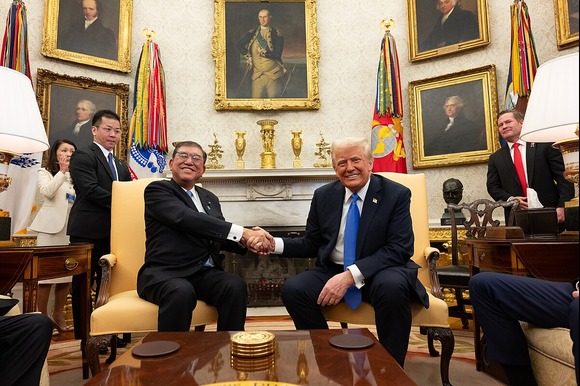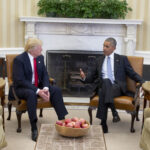President Donald Trump has announced what he described as a “massive” trade agreement with Japan, one of the United States’ largest trading partners. The deal includes a commitment by Japan to invest $550 billion (£407 billion) into the U.S. economy. Under the agreement, Japanese goods entering the U.S. will face a 15% tariff—substantially lower than the 25% tariff Trump had previously threatened.
Taking to social media, Trump claimed that Japan would now open its markets further to U.S. exports, including cars, trucks, rice, and other agricultural products. At a White House event Tuesday evening, the president declared, “I just signed the largest trade deal in history, I think maybe the largest deal in history with Japan. They had their top people here, and we worked on it long and hard. And it’s a great deal for everybody. I always say it has to be great for everybody. It’s a great deal.”
Japanese Prime Minister Shigeru Ishiba welcomed the agreement, noting that it represented “the lowest figure to date among countries with trade surpluses with the U.S.” He also announced that tariffs on U.S.-bound Japanese vehicles and auto parts would be reduced from 25% to 15%.
The new 15% tax, however, remains above the 10% rate Trump temporarily imposed on Japan and several other countries between April and July when he suspended more severe reciprocal tariffs. The temporary suspension had given Tokyo a brief window to negotiate, following a 90-day pause on broad tariff plans implemented during what Trump dubbed “Liberation Day” on April 2.
Automobiles make up a critical component of Japan’s exports to the U.S., accounting for nearly a quarter of total exports and nearly 3% of the Japanese economy. In 2019 alone, Japan exported $410 billion (£300 billion) worth of automotive products to the U.S., according to data from the U.S. International Trade Administration.
Ishiba highlighted that Japan was “the first in the world to reduce tariffs on cars and auto parts without any quantity restrictions.” In contrast, U.K. car exports to the U.S. are taxed at a lower 10% rate but face a cap of 100,000 vehicles per year.
Despite the fanfare, the agreement does not entail any reciprocal tariff reductions on the Japanese side. This asymmetry has led to criticism, particularly from American car manufacturers. Matt Blunt, president of the American Automotive Policy Council—which represents Ford, General Motors, and Stellantis—voiced strong opposition, labeling the deal “a bad deal.” He pointed out that the agreement lowers tariffs on Japanese imports while leaving the current 25% tariffs on vehicles and parts from Canada and Mexico intact.
In addition to the Japan agreement, the U.S. also unveiled new trade pacts with the Philippines and Indonesia. Imports from both nations will be taxed at a 19% rate upon entering the U.S. In return, Indonesia has pledged to eliminate 99% of its tariff barriers on American goods, while the Philippines will reduce tariffs on U.S. vehicle imports.
According to Shigeto Nagai of Oxford Economics, Japan’s decision to lower its primary tariff rate to 15% represents “the best compromise at this stage.” He also noted that the planned $550 billion Japanese investment would significantly contribute to Trump’s broader agenda of reviving American manufacturing and job creation.
Trump had earlier warned Japan that failure to reach a deal before August 1 would result in the imposition of a 25% tariff on Japanese exports. This ultimatum, delivered in a letter to Tokyo earlier this month, reinforced the urgency behind the negotiations.
Japan, currently the fourth largest economy globally—following the U.S., China, and Germany—saw its benchmark Nikkei 225 index surge over 3% on Wednesday. Automotive stocks, including Toyota, Nissan, and Honda, posted strong gains following news of the deal.
The trade agreement also arrives at a politically turbulent moment for Prime Minister Ishiba. His ruling Liberal Democratic Party (LDP) recently lost its majority in the upper house of the Japanese parliament following weekend elections. This follows a previous defeat in the more influential lower house last year, fueling calls for Ishiba to step down.
The BBC has reached out to both the White House and the Japanese Embassy in Washington for further clarification and details on the agreements.






